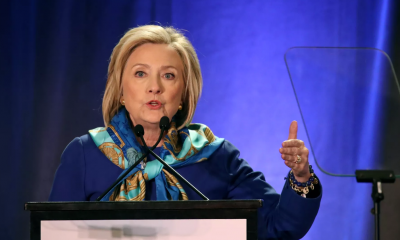World
Hillary Clinton jabs Republicans on immigration

Washington: Democratic frontrunner presidential candidate Hillary Clinton attacked her Republican rivals on immigration saying they are on a “spectrum of hostility” that was really regrettable in a nation of immigrants like America.
Republican front runner Jeb Bush, son of a president and brother, and real estate mogul Donald Trump came in for particular criticism in her first interview of the 2016 presidential race aired on CNN Tuesday.
Bush, said the former first lady and Secretary of State, “doesn’t believe in a path to citizenship. If he did at one time, he no longer does.”
Clinton said she is also “very disappointed” in Trump for his comments about immigrants and in the Republican Party for not condemning his remarks more quickly.
“They’re on a spectrum of hostility, which I think is really regrettable in a nation of immigrants like ours,” she said of the Republicans while touring Iowa, the first state from where presidential campaigns traditional begin with party caucuses.
The Bush campaign asserting that the former Florida governor “believes in a conservative legislative solution to fix our broken immigration system”, in turn accused Clinton of flip-flopping on immigration.
“Hillary Clinton will say anything to get elected and her numerous flip-flops on immigration prove it,” said Emily Benavides, a Bush campaign spokeswoman, in a statement.
In her interview Clinton also dismissed the suggestion that the American people have a problem trusting her.
“People should and do trust me,” she said blaming the “barrage of attacks that are largely fomented by and coming from the right” for fuelling a perception that trust is an area of vulnerability for her.
Republicans, Clinton suggested, have sought to turn controversies like her use of a private email address and the Clinton Foundation’s actions against her.
And that, Clinton said, is why national polls and swing-state surveys have found that a majority of voters say they don’t see her as honest and trustworthy.
A Quinnipiac University Swing State poll found that by margins of 8 to 14 percentage points voters in Florida, Ohio and Pennsylvania are sceptical of Clinton’s trustworthiness.
“I think it’s understandable that when questions are raised, people maybe are thinking about them and wondering about them,” Clinton said.
She similarly dismissed questions about her use of a personal email address on a private server while serving as secretary of state.
Clinton said she turned over all the emails that had anything to do with public business, and that she broke no laws in sticking with one device because she’s not technically savvy.
“This is being blown up with no basis in law or in fact. That’s fine, I get it — this is being, in effect, used by the Republicans in the Congress. OK,” Clinton said.
World
Lockdowns in China Force Urban Communities to Defy Censorship and Vent Frustration Online

Shanghai’s rich middle class is leading a wave of online dissent over the strict and prolonged lockdowns imposed in various parts of the country. Chinese internet censorship is struggling as patience is wearing thin in many urban centers, coming up with creative forms of online protests.
Social Media Posts Revealing Lockdown Tension in Shanghai
Drawn-out lockdowns are nothing new in China as authorities insist with the nation’s zero-Covid policy since the start of the pandemic. Currently over This time around, however, metropolitan areas like Shanghai are increasingly difficult to keep quiet, given that its more than 25 million residents have seen weeks of total isolation along with food shortages and many other service interruptions.
Dozens of towns and reportedly over 300 million Chinese citizens have been affected by lockdowns of different severity. As expected, urban netizens have been most outspoken over their difficulties by finding creative ways to get around state censorship and bans placed on topics, news comments and spontaneous campaigns.
Shanghai residents have been using mobile proxies and hijacking seemingly unrelated hashtags to talk about healthcare issues, delivery failures and the overall severity of their situation. The “positive energy” that the Chinese government wants to transmit during the recent prolonged series of lockdowns does not come naturally to those counting food supplies and online censors are working hard to filter words, trending topics and undesired social media sharing.
WeChat groups and message threads are under constant monitoring. Posts questioning the zero-Covid approach have been quickly deleted, including by leading Chinese health experts like Dr. Zhong Nanshan. Video footage is soon censored and protests and investigations are quickly made to disappear.
Where this has not worked, officials have exposed banners with warnings and outright threats like “watch your own mouth or face punishment”, while drones have been patrolling the city skies. Yet, if anything, this has led to further tensions and unspoken confrontation with Shanghai’s educated and affluent middle class.
Creative Online Solutions Harnessing Civic Energy
Announcements by Chinese social media that they would be publishing the IP addresses of users who “spread rumors” have not helped either. Tech industry research has shown that much of Asia’s tech-savvy population has a habit of using mobile proxies and other privacy tools, quickly finding workarounds to browse the internet freely and talk to the world about the hottest topics.
The sheer volume of forbidden posts is already a challenge for the very censorship system, experts explain. Unable to track all trending hashtags, state workers overlook topics that speak about the US, Ukraine or other popular news. Linking human rights elsewhere to their situation, Chinese online dissidents establish their informal channels and “hijack” the conversation to share personal or publicly relevant information about the Covid suppression in their town.
Sarcastic and satirical posts still dominate. Others hope to evade the censors by replacing words from famous poems or the national anthem. One thing is certain – social media, when harnessed with the right creativity, has proven its ability to mount pressure on the government in even some of the most strictly controlled tech environments like China.















